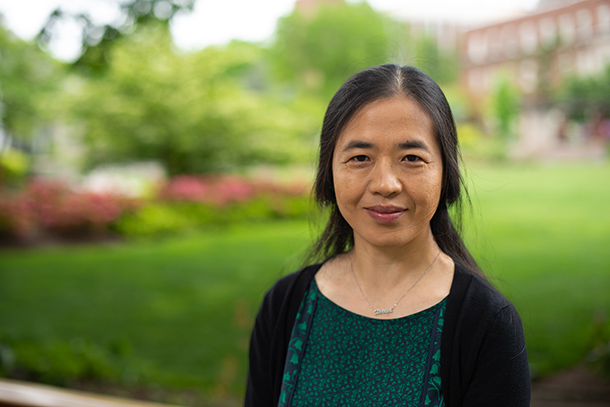
Li Li, professor of civil and environmental engineering, focuses her research on the future of water resources, including water availability and quality. Credit: Kelby Hochreither/Penn State
Engineer named first holder of Barry and Shirley Isett Professorship
June 2, 2022
By Mariah Chuprinski
UNIVERSITY PARK, Pa. — Li Li, professor of civil and environmental engineering at Penn State, was named the first Barry and Shirley Isett Professor in Civil and Environmental Engineering.
The professorship was established in 2019 as a $1 million gift by Barry and Shirley Isett. Barry graduated from Penn State in 1958 with his bachelor of science in civil engineering. The appointment will be for five years, ending in 2027, with reappointment possible after a successful performance review of the initial period.
Li was appointed by Patrick Fox, the John A. and Harriette K. Shaw Professor and head of the Department of Civil and Environmental Engineering, on behalf of the College of Engineering, the Department of Civil and Environmental Engineering and the Institutes for Energy and the Environment.
“We could not be prouder of Dr. Li’s world-class leadership in teaching, research and service, and I am delighted to appoint her as the first Isett chair, in honor of Barry and Shirley,” Fox said. “She is the first woman in our department to serve as a chaired full professor.”
Li will receive funds from the endowment to support her teaching, research and service goals.
“I am very grateful for the award, which is a wonderful recognition of my achievements in academia,” Li said. “In a broader sense, it is really a recognition for women engineers like me and offers resources to empower others and build the research community.”
Li’s research centers on the future of water resources, including water availability and quality, in the face of climate change and human impacts, such as agriculture and urbanization.
“I plan to use the funding to pursue risky, cross-disciplinary and societally-relevant research ideas that are often challenging to get funded, as well as to support women scientists and people from underrepresented groups,” Li said.



